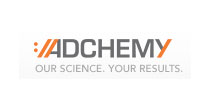 Adchemy announced today a “SaaS software solution to extract underlying intentions from keyword search terms” for paid search ad targeting purposes. In addition, “Accenture Interactive, a business within Accenture that offers services that cover all aspects of digital consulting, marketing analytics and media management, is teaming with Adchemy to develop industry-specific WordMaps for the telecommunications, insurance, consumer banking, retail and consumer packaged goods sectors.” Read the release.
Adchemy announced today a “SaaS software solution to extract underlying intentions from keyword search terms” for paid search ad targeting purposes. In addition, “Accenture Interactive, a business within Accenture that offers services that cover all aspects of digital consulting, marketing analytics and media management, is teaming with Adchemy to develop industry-specific WordMaps for the telecommunications, insurance, consumer banking, retail and consumer packaged goods sectors.” Read the release.
Adchemy VP of Product Anurag Wadehra discussed the new product and search intent data.
AdExchanger.com: How is search intent different than the intender data available from companies like BlueKai and eXelate?
AW: The concept of search intent is substantially different in a number of ways from the specific intender data collected by BlueKai and others.
Search Intent data is more granular. Intender data is behavioral data based on a user’s observed behavior: she visits the laptop department of an ecommerce site; she becomes a “laptop purchase” intender.
With the Adchemy WordMap, for any given category or domain (such as “laptops”), there can exist very granular intents, such as value, size, condition, brand, color, peripherals, processor speeds, etc. In other words, almost any word that a user might include in a laptop-related query can be an intent. The Adchemy WordMap extracts intents and topics from the query, essentially acting as a translation layer between the user’s query and the underlying intents. For example, when a user enters the query “cheap lightweight laptop”, the search engine (and, indirectly, the marketer) can infer the user’s intent is for “laptops under $500 and less than 11 inches in diagonal screen size”. This granular search intent data, in turn, can be used to deliver more specific ads and landing pages to all the users.
Again, this can’t be achieved through behavioral (intender) data – the user may visit the laptops section of an ecommerce vendor and may be placed in the “in market for a laptop” segment, but the specific nature of the laptop he or she was looking for is lost in the broader intender segmentation. Search Intent can be proprietary to the advertiser or SEM agency. BlueKai and other behavioral vendors define and market intender segments, and, for the most part, advertisers must buy these intender segments “off the shelf.”
With Adchemy WordMap, segmentation is fully proprietary to the advertiser or SEM agency. For example, two laptop manufacturers might both be Adchemy WordMap customers. One manufacturer might parse “cheap laptop” as “laptops less than $500”; the other manufacturer might parse “cheap laptop” as “refurbished laptops less than $400.” Ultimately, WordMaps are assets owned by the advertiser or an SEM agency, and any proprietary marketing strategies or insights can be encapsulated into a WordMap.
Can you quantify what kind of lift are initial (beta) clients seeing with the Adchemy WordMap versus previous SEM methods?
Adchemy WordMap clients have experienced anywhere from 30% to 400% improvement in conversion.
Do you think Adchemy WordMap replaces SEM offerings by Efficient Frontier, Kenshoo and Marin among others? Or can it be used in conjunction?
The Adchemy WordMap application works in conjunction with 3rd party bid management tools like Kenshoo and Marin Software. All SEM agencies – including Efficient Frontier – can be potential Adchemy partners. As we mentioned, Adchemy is actively looking to partner with SEM agencies to help implement and manage Adchemy WordMap-based campaigns for advertisers.
What is the target market and pricing model for Adchemy WordMap?
The Adchemy WordMap application is most useful to large advertisers who spend $100,000 or more per month in paid search. Adchemy WordMap pricing is a monthly technology license fee based on the number of visits per month generated by paid search campaigns powered by the Adchemy WordMap.
Are there any plans to integrate the Adchemy Word Map opportunity with display? Perhaps driving top-of-funnel display toward search with dynamic creative and landing page messaging?
Absolutely. Adchemy WordMaps encapsulates the intent behind a search query. Once a searcher’s intent is known, it can be stored in Adchemy’s Audience Data Cloud and can be used later to conduct more targeted display media buys, and dynamically render more targeted banner ads and landing pages.
By John Ebbert










